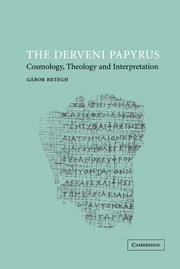Book contents
- Frontmatter
- Contents
- Preface
- List of abbreviations
- Text and translation
- 1 The find
- 2 The first columns
- 3 The reconstruction of the poem
- 4 The interpretation of the poem
- 5 The cosmic god
- 6 Cosmology
- 7 Anaxagoras
- 8 Diogenes of Apollonia and Archelaus of Athens
- 9 Physics and eschatology: Heraclitus and the gold plates
- 10 Understanding Orpheus, understanding the world
- Appendix: Diagoras and the Derveni author
- Bibliography
- Index verborum
- Index of passages
- Index of modern names
- Index of subjects
10 - Understanding Orpheus, understanding the world
Published online by Cambridge University Press: 23 December 2009
- Frontmatter
- Contents
- Preface
- List of abbreviations
- Text and translation
- 1 The find
- 2 The first columns
- 3 The reconstruction of the poem
- 4 The interpretation of the poem
- 5 The cosmic god
- 6 Cosmology
- 7 Anaxagoras
- 8 Diogenes of Apollonia and Archelaus of Athens
- 9 Physics and eschatology: Heraclitus and the gold plates
- 10 Understanding Orpheus, understanding the world
- Appendix: Diagoras and the Derveni author
- Bibliography
- Index verborum
- Index of passages
- Index of modern names
- Index of subjects
Summary
Who is, then, the Derveni author? As I am unable to answer this question with a name, in what follows I shall try to identify him by describing the specific nature of his project.
Since the first reports and partial transcripts of the papyrus it has been customary to call the text a commentary and its author a commentator. I myself have argued in chapter 3 that the Derveni author offers a systematic commentary on the Orphic poem. But does this make the text as a whole a commentary? The trouble, of course, lies in the first columns. As has been made clear by the publication of the first seven columns by Tsantsanoglou, the commentary on the Orphic poem only starts in column 7. This fact makes it at least problematic to continue to define the whole text as a commentary; the first columns certainly have a bearing on how best to describe the overall subject matter and genre of the text. Let me list some of the emerging options:
The subject matter of the text as a whole is the interpretation of the Orphic poem. The first columns explain some external features or realia relevant for the understanding of the poem.
The subject matter of the text as a whole is not the Orphic poem, but the description and explanation of some ritual practices. The exegesis of the Orphic poem is subordinate to this, because it is in some way relevant for the understanding of the ritual practices in question.
[…]
- Type
- Chapter
- Information
- The Derveni PapyrusCosmology, Theology and Interpretation, pp. 349 - 372Publisher: Cambridge University PressPrint publication year: 2004
- 1
- Cited by



